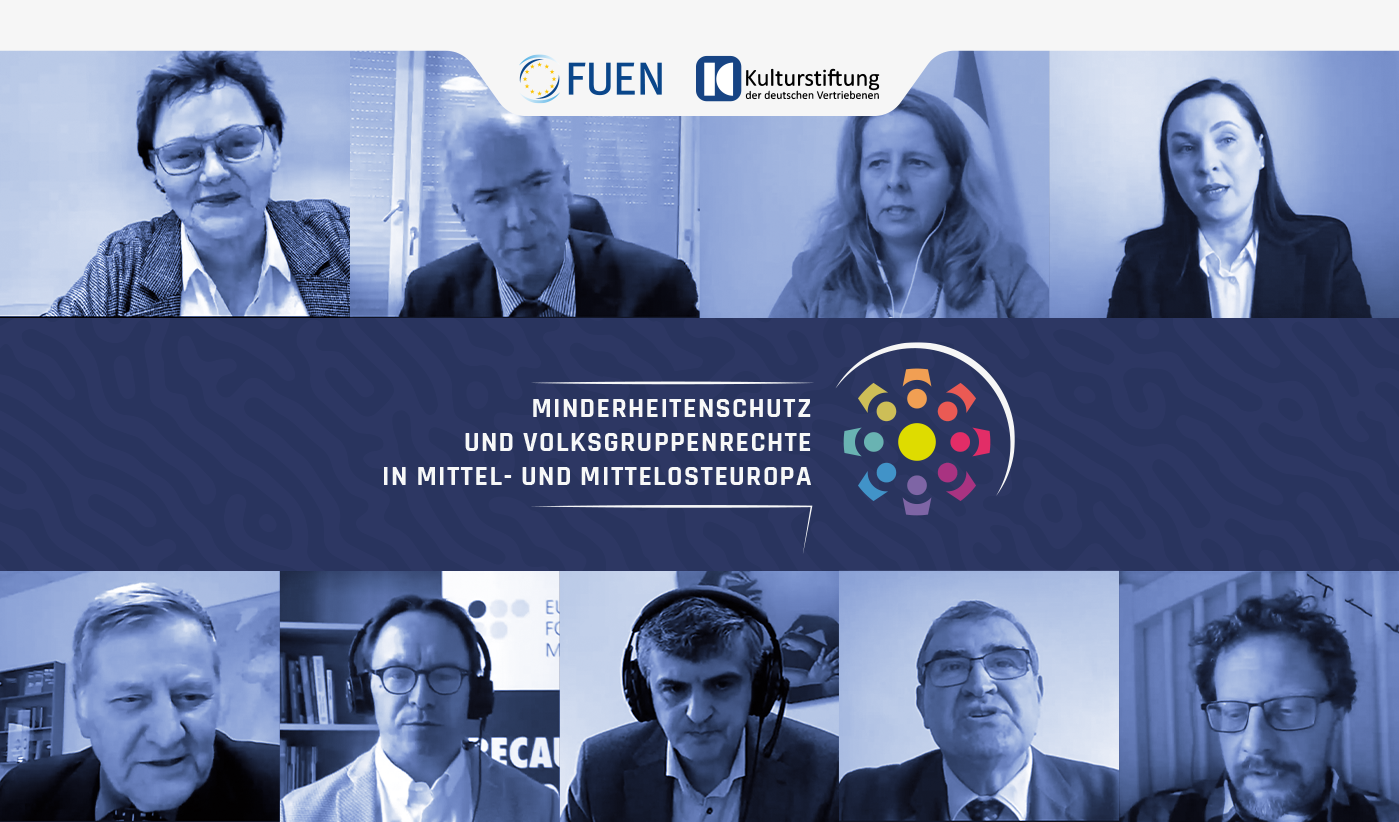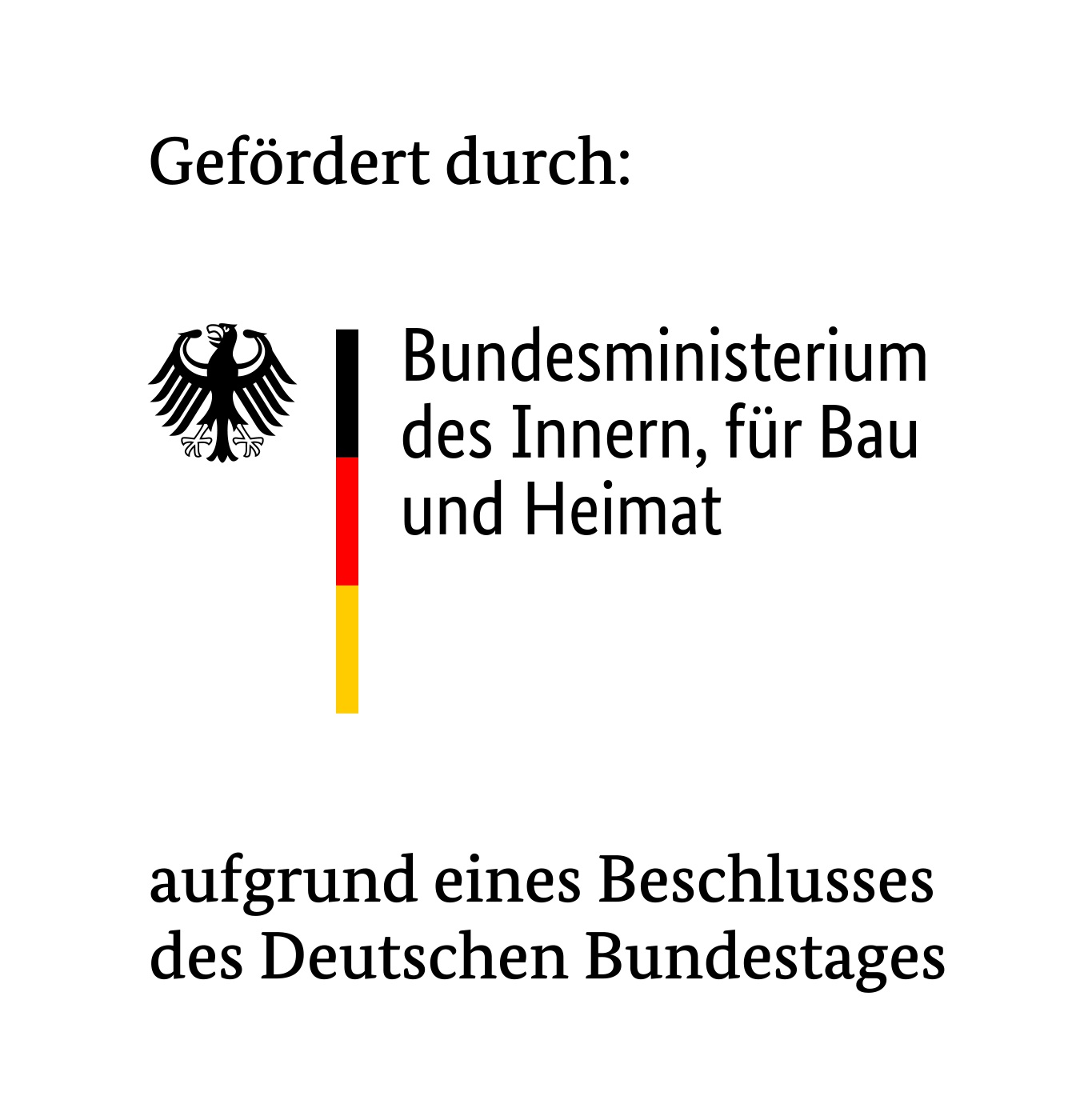
Conference series “Minority Protection and Ethnic Group Rights in Central and Central Eastern Europe" focuses on Bulgaria, Estonia and Ukraine
03.05.2021On 29 April, the Federal Union of European Nationalities (FUEN) and the Cultural Foundation of German Expellees continued their conference series “Minority Protection and Ethnic Group Rights in Central and Central Eastern Europe" which has been running since October 2020. This time the focus was on Estonia, Ukraine and Bulgaria. In ten-minute presentations, experts spoke about the current legal and practical handling of minority rights in these countries. Afterwards, the audience also had a chance to speak and address country-specific problems.
At the beginning of the online conference, which was also streamed live on FUEN's Youtube channel, the constitutional and international law expert Prof. Dr. Dr. h.c. mult. Gilbert Gornig summarised the results of the conference so far. Although this was the last event for the time being, there were still many more countries to discuss and so he hoped to see this conference format again soon, he said.
Afterwards, Sylvia Lehmann, Member of the German Bundestag, spoke about the importance of the protection of minorities in her welcome address. "Minority policy must be approached as an active peace policy," she said. Especially in a community of states like the EU, with more than 50 million members of national minorities, this means unconditional commitment to minority rights. However, equal participation is not yet a matter of course everywhere in the EU. Therefore, FUEN’s Minority SafePack Initiative represents an important step towards the creation of European standards and should be taken up again by the European Commission.
Afterwards, Prof. Dr. Peter Hilpold from the University of Innsbruck took over the moderation of the event. The legal scholar and minority rights expert had already lectured on the legal situation of minorities in Austria in this conference format in February.
Prof. Vello Pettai, Director of the European Centre for Minority Issues (ECMI), presented the legal situation of minority protection in Estonia in the first thematic block of the day. After the country regained independence in 1991, Estonia had revived its historical systems of cultural autonomy for its minorities, but these soon reached their limits. Although the right to preserve one's own ethnic identity and language is enshrined in the constitution, the approximately 25 per cent of the population who count themselves as part of the Russian minority in particular do not have the same opportunities everywhere in the country when it comes to implementing their language rights, Pettai explains.
Natalia Ermakov, President of the Estonian Union of National Minorities, focused on the practical implementation of legal rights. She emphasised that all minorities in Estonia have the same opportunities to participate in cultural life and that the state supports their activities. She also said that minority languages could often be used in dealings with the authorities and that especially in the current Corona crisis, the offices had offered multilingual consultations. In the highly digitalised country, many government websites are now trilingual and available in Estonian, English and Russian.
In the open discussion that followed, audience members raised the question of whether Estonia should establish a second official national language. One should look more for a balance in the country so as not to displace other languages by unilaterally strengthening Estonian, it was noted. Natalia Ermakov agreed that the language situation could be improved, but pointed out that there are already schools with minority language teaching, media and cultural centres for the minorities in Estonia. The representatives of the NGO "Russian School of Estonia" expressed their concern about education in the Russian language, in view of the Estonian government's plans to reform the education system
For Ukraine, Prof. Dr. Andrij Kudrjačenko from the University of Kiev was able to point to a legally enshrined right to learn the mother tongue in schools and universities. Ukraine had also experienced a strong shift in favour of the Russian language at the time of the Soviet Union. That is why, after its renewed independence in 1991, great emphasis was placed on consolidating Ukrainian in everyday life. Despite politically instrumentalised language laws, the approximately 130 nationalities and national groups in the country continue to be protected by law in the practice of their culture.
Dr. Olena Bogdan, Head of the State Service of Ukraine for Ethnic Affairs and Freedom of Conscience, shed light on the practical implementation of the state guidelines. Studies indicate, she said, that many people now do not strive for a clear identification with one ethnic group, but adopt multiple ethnic identities. In Ukraine, information and textbooks are available in different languages, as are minority media. The regional competence of these media is an important unique selling point compared to the large offer from abroad.
Prof. Dr. István Csernicskó, Rector of the Ferenc Rákóczi II Transcarpathian Hungarian College of Higher Education in Berehove, spoke about the situation of the Hungarian minority in Ukraine. He regretted that Ukraine did not adhere to the European Charter for Regional or Minority Languages. He said that the creation of the office of a commissioner for the protection of the national language had promoted the politicisation of the issue and that new laws had now been introduced that would, for example, prohibit bilingual place and street signs in the future, even in places where they still exist today. The aim is to steer the choice of colloquial language towards Ukrainian.
Dr. Alexey Pamporov from the Bulgarian Academy of Sciences then explained the legal situation of minorities in Bulgaria. The country's minority policy is based on a very restrictive census, which does not allow for a realistic self-location of the respondents. The figures, which are also passed on to the EU, are therefore not very meaningful and provide a distorted picture of the needs with regard to the protection of minorities. Moreover, political participation is only possible through established parties due to a ban on ethnically or religiously based parties.
Rakovsky Lashev, Senior Diplomat at the Bulgarian Ministry of Foreign Affairs, also spoke about the restrictions in the political process. Although elections and election advertising are only provided for in Bulgarian, discussions on political issues are not affected by this. The inclusion of minorities is certainly desired, but does not depend on recognition as a minority. That is why the country defines minority languages as "mother tongues" and minorities as "ethnic groups".
At the preliminary conclusion of the conference series, Éva Adél Pénzes, FUEN Secretary General, and Thomas Konhäuser, Managing Director of the Cultural Foundation of German Expellees, thanked the speakers. Both emphasised the great importance of the protection of minorities and the necessity of bringing this topic into the conversation again and again with up-to-date, comparative information. Thomas Konhäuser brought up the idea of a future symposium that could help to bundle the competences on the protection of minorities and the rights of ethnic groups in Central and Central Eastern Europe. First, however, an academic conference volume was planned that would collect the topics discussed in the conference series.
Finally, the organisers thanked the Federal Ministry of the Interior, Building and Community and the Office of the Prime Minister of the Republic of Hungary for their support of the conference series.
The recording of the conference will be available on the Youtube channels of the FUEN and the Kulturstiftung.
Further information on the experts and the conference programme can be found at: https://minorityconf.org/

PRESS RELEASES
- FUEN wishes you a peaceful Christmas season, restful days and a bright, hopeful start to the new year!
- FUEN calls on the EU to act over systematic ethnic-based land confiscations in Slovakia
- Women of Minorities conference in Budapest calls for structural change to ensure equal political participation of minority women
- FUEN President Olivia Schubert at UN Forum on Minority Issues in Geneva
- "Laboratory of Peace": 28th Seminar of Slavic Minorities held in European Capital of Culture Gorica/Gorizia
- Equality in Political Participation and Representation: Third “Women of Minorities” Conference to Be Held in Budapest
- FUEN Working Group on Education discusses challenges and future of minority schooling in Europe
- 28th Seminar of Slavic Minorities in Europe to take place in Gorica/Gorizia, Italy
- Olivia Schubert in her first interview as FUEN President
- FUEN Assembly of Delegates elects new leadership – Olivia Schubert becomes new President














